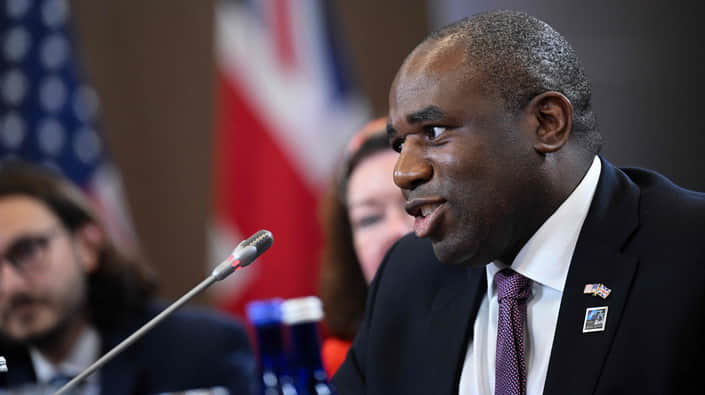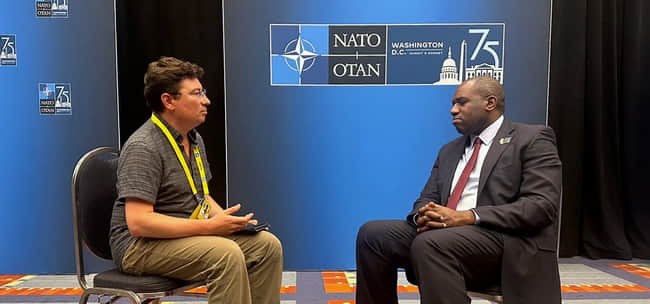Storm Shadow strikes on Russia, military aid for Ukraine and Putin’s unacceptable ideas: An interview with the new UK Foreign Secretary

Exactly one week ago, there was a fundamental change in the United Kingdom’s leadership as the Conservatives, who had been in power for over 14 years, moved to the opposition and the Labour Party, led by Keir Starmer, gained an absolute majority and formed a government.
What does this mean for Ukraine?
Will the new British government be as bold in supporting Ukraine as its predecessors? European Pravda spoke briefly with David Lammy, the new UK Foreign Secretary, on the sidelines of the NATO summit to answer these questions.
His main message is that British support remains unwavering. London has confirmed the scale of aid for the Ukrainian Armed Forces. The details are still uncertain, though. The key question is whether the new UK government will be ready to go further than its predecessors in allowing strikes deep into Russia. The signals in this regard are positive but cautious.
We got used to the UK government as a leader in supporting Ukraine under the Conservatives. What will change for Ukraine with the new Labour government?
Absolutely nothing.
The UK has been forward leaning in our support for Ukraine. That support throughout the last two and a half years has been bipartisan. That's why Keir Starmer has travelled to Ukraine (Starmer was in Ukraine in 2023 – EP). I was in Ukraine too just a few months ago, before the elections.
We're very, very clear that we support Ukraine to win this fight. And we will provide the financial, military and humanitarian aid you need to succeed in this fight and to stand up to Vladimir Putin's new fascist imperialism and aggression.
That is why it was also important for me to travel to Poland and Sweden on my first weekend as Foreign Secretary – to express solidarity in the countries that really understand Russia's aggression.
It was also important for me to be in Bucha with families who've lost their loved ones, to meet ordinary citizens playing their role in efforts to fight back against the aggression against Ukraine. And I will be in Ukraine again over the coming days to show my solidarity.
So will the UK's policies and approaches towards Ukraine stay the same?
I can't emphasise enough that it’s not just words. It's action!
And that is why we made the decision to ensure £3 billion worth of funding (pledged to Ukraine by the previous government – EP) not just this year, but every year up to 2030, and for as long as it takes.
That is the commitment of this government and the British people.
We appreciate the UK's assistance and its willingness to go further than other partners, for example, in permitting strikes on Russian territory. Will this approach be retained?
There is a right to self-defence under international law. So it's for Ukraine to determine that.
I can't comment on the United States. But for the UK, we have had discussions with Mr Zelenskyy over the course of the last few days, and we've undertaken to go away and look at some other things. But I'm not going to get into operational decisions for very, very good and serious reasons, because we do not want Putin to know exactly what our intent is.
But I recognise that to defend itself, it's important that Ukraine has the equipment and the weaponry it needs, and also that often the United Kingdom has led in those discussions within the wider family of allies.
Can Ukraine strike remote Russian airports with Storm Shadow missiles? This intention is no secret. Ukraine publicly raised this issue at the NATO summit.
I have heard what Mr Zelenskyy has said. He has shared some views with us that we are reflecting on further.
And as I said, I support Ukraine's right to self-defence now even more, because of that brutal attack on a children's hospital [Okhmatdyt] a few days ago.
I must press you, because this is important. The US has limited the use of its weapons to strike targets in Russia to areas near the border. Does the UK allow the use of its missiles further afield?
I can't comment on the United States.
But for the UK, we have had discussions with Mr Zelenskyy over the course of the last few days, and we've undertaken to go away and look at some other things.
But I'm not going to get into operational decisions for very, very good and serious reasons.
Why are the allies afraid? And are you not afraid of Russia's response?
I don't want to comment on the position of other allies, but I do recognise that. It was put very poignantly during a discussion at the Summit about the F-16 fighter jets – that those fighter jets are there today, but had they been there a year ago when they were being asked for, Ukraine would be further forward.
So I do recognise that this issue of weaponry and the right weapons to succeed is a very important one indeed.
Russia's war and aggression is brutal. But this is a European war. Ukraine is fighting on behalf of Europe.

Putin poses a systemic risk to European security. And that's why we have to be steadfast in our support across the whole of the NATO family.
If we allow dictators and authoritarian leaders to invade their smaller neighbours, and if Putin wins this battle, then I'm afraid the security of the whole global community is at risk.
The UK is a leader in the maritime and naval industries. Should we expect you to take the lead in modernising Ukraine’s fleet?
We have had that discussion here at the Summit.
Indeed we are a great naval nation. We have a world-beating Navy. We stand ready to provide whatever further training and support Ukraine needs to win this fight in the sea as well.
So far, your advances in the Black Sea have been tremendous. But there is more to do over the coming months, and we stand ready to help Ukraine. There is more to do, and we're open to that discussion.
And the final question – about Ukraine’s NATO membership. Am I correct in understanding that Ukraine is unlikely to join NATO until the war is over?
We don't know when the war is going to end. The war ends when Putin has left. I don't want to make predictions about when it will happen.
But I heard Mr Putin giving a speech just a few weeks ago. What he suggests as peace is Ukraine's capitulation.
That is unacceptable. It is intolerable.
I recognise that there is a very bloody fight for Ukraine's future taking place as we speak. I can only reiterate that the United Kingdom and NATO allies stand with Ukraine in that fight.
It's a fight that sadly will go on for many months ahead.
But my question was about NATO membership. Is it possible to join the Alliance before the war ends?
The form of words that NATO has come up with is the form of words that we have got to stand by. This is an irreversible path.
Sergiy Sydorenko
Editor, European Pravda
From Washington